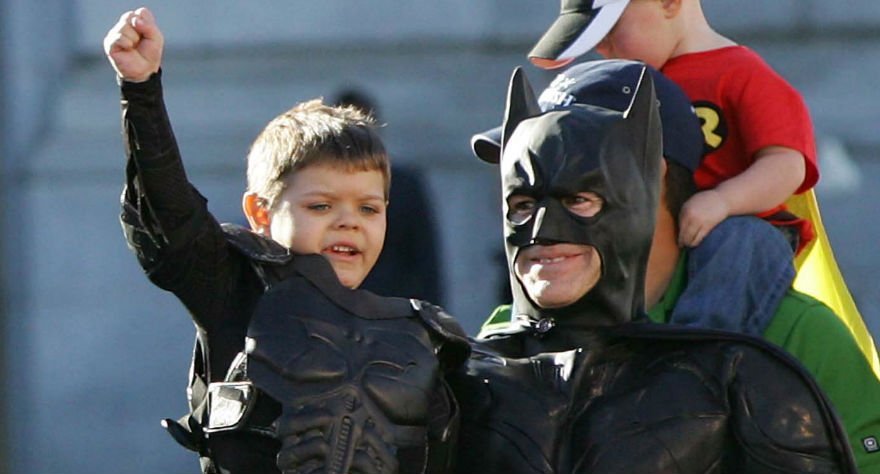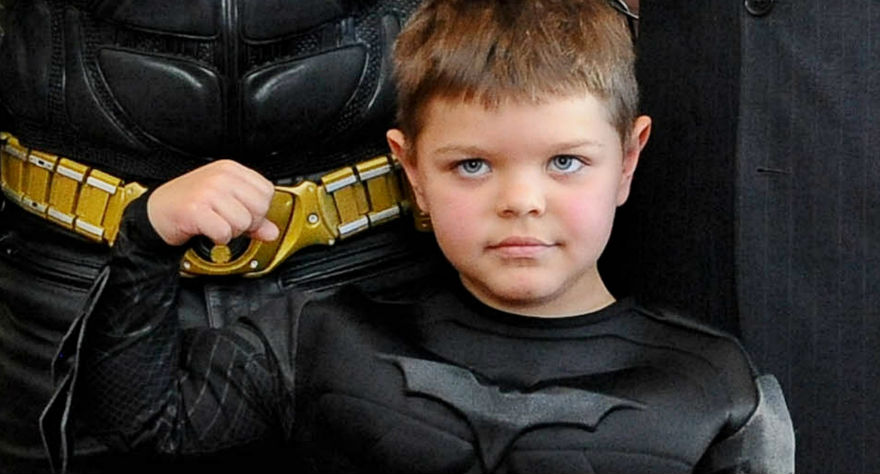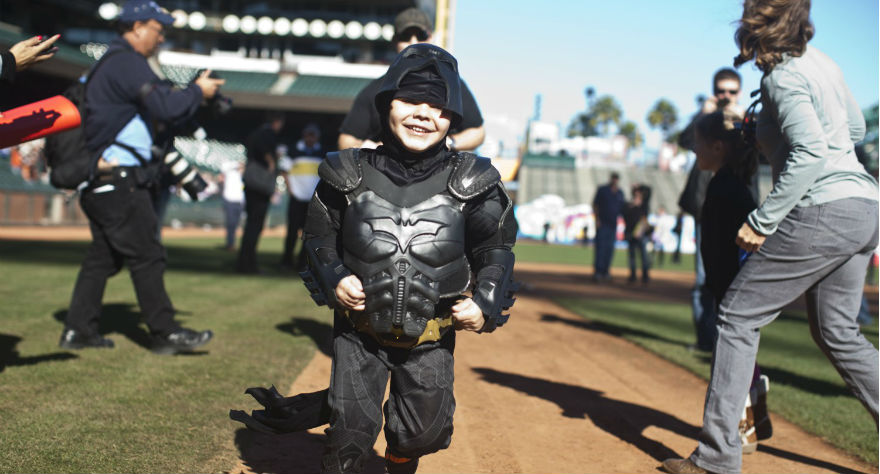‘Batkid Begins’ Filmmaker and Batkid Organizers On Making Dreams Come True

Taking a behind-the-scenes look at one of the most extraordinary human interest stories in recent memory, Dana Nachman’s Batkid Begins is about the importance of volunteerism and the awe-inspiring results of millions of strangers coming together to make a kid’s dream come true. On November 15th, 2013, thousands of people gathered in the streets of San Francisco and the world watched as 5-year-old Miles Scott, still recovering from leukemia, lived out his dream of fighting crime as Batkid alongside his hero, Batman.
It was interactive theater on a grand scale, and Nachman’s documentary follows the countless craftsmen, actors, city workers and volunteers who worked tireless hours to make Miles’ day. Organizing the event was Patricia Wilson, executive director of Make-A-Wish Greater Bay Area, and playing the role of the villainous Penguin was visual effects artist Mike Jutan. I spoke to Nachman, Wilson and Jutan in the heart of San Francisco about the film and the spirit of kindness and playfulness they created on that memorable afternoon.
Batkid Begins is in theaters now.

What would you say is the biggest misconception about Batkid day?
Patricia: I’ve heard people try to be naysayers and say, “Couldn’t these resources be used for other kids? Why is this kid so special?” My favorite statistic is, 100% of children who qualify for Make-A-Wish receive a wish. We didn’t ask for 25,000 people to come out; we were doing our usual thing. Naysayers: go see the film, because you’ll see what happened. You can’t be a cynic. If you find something wrong with it, how ’bout you advocate for what you love? How about you go out and do something and volunteer, because that was the spirit of the day.
Mike: As Taylor Swift says: “Haters gonna hate.”
Dana: Any interview where you can quote Taylor Swift is a good interview. One of the things I’d say is a misconception about the film is that I worry people think it’s really sad. It’s super not-sad! Miles is in remission and living a great life. I felt like it was important that we get that out of the way in the first nine minutes of the film so that after that it’s pure happiness.
Was the comic-book aesthetic idea there from the start?
Dana: Yes. It was there in my mind, and I found an animator in Rob Simmons, who’s an amazing animator. He did it for “way too indie” rates! [laughs] It’s always hard to get people to work on your film, but he got what this was for.
I think another thing people should know is that the movie isn’t all about Miles.
Dana: Right. It’s about the people who came together for Miles. The volunteers and the people on the streets who skipped out on work to be there for this kid. Everybody heard the 140-character version of this story. The film really goes behind the scenes and shows what made the event so touching.
Mike: For me, one of the most interesting parts of the movie is, on the day, the people were the filmmakers. Everyone brought their phones, and Twitter, Instagram and Facebook was how you saw it play out. There was traditional media there as well, of course. But people weren’t really processing what the event really meant that day. They were just there crying and cheering in their costumes and being a part of the community of it. With the movie, I think we can spread a deeper message of what we think San Francisco said to the whole world. This is what’s possible when people work together. Everyone there was a volunteer. It’s amazing that those people felt a sense of community this little boy inspired. Our goal was to make Miles smile. No matter how big things got, it was his wish day and he needed to have a good time. If the Penguin made him cry, I failed.
Dana: Another thing that was cool was that there wasn’t a bit of politics to it. It had nothing to do with anything controversial. It was just society coming together.
Patricia: The Scott family is back on their farm and they aren’t doing any media requests. Miles was invited to the State of the Union by a democrat and a republican because they thought, if he could make the Internet nice, he could make Washington D.C. nice! I was charmed by the fact that they wanted Batkid to save Washington D.C.. [laughs]
I like how much time the film takes to show the hard work of all the volunteer craftsmen and artists.
Mike: Like the opera people, who made the costumes during their busiest season. They pulled all-nighters to get the costumes going. It was amazing. Everyone put in as much of themselves as they can.
Patricia: That’s true of every wish we do. Our chapter will do 370-390 wishes this year alone. The heroes of this film are all the volunteers who were happy to help. We had school teachers take their classes out of school that day. They got a chance to witness everything happen first-hand.
Dana: That was a goal of the film, to not rehash the day but show how it came to be. We wanted to show all the hard work and dedication it took, and they were going to work that hard whether 25,000 people showed up or not.
I’ve lived in the Bay Area my whole life, and I’m also a lifelong Batman fan. Gotham has never been associated with cities that look like ours. It’s always Chicago or New York or something. For this to come together and happen here…
Dana: …is your lifelong dream. [laughs]
It totally is! San Francisco doesn’t look like Gotham at all, but it was Gotham for one day. Thanks for making that happen, at least for me!
Dana: Make-A-Wish, man!
Patricia: My friend called me the week of, before the wish happened. She said, “Right now, go to Google and type in Batman.” You know what came up? Batkid. I think we broke something.
Mike: I feel like Batkid has added to Batman folklore. I really do! He has a Wikipedia page and everything. It’s crazy.

There’s a lot of great stuff happening for our city lately, and we’ve always been prideful, but this is something else.
Patricia: We had the same setup as the World Series parade. As many people showed up for Batkid. The difference is, on Batkid day, everybody picked up their trash, so the city didn’t have to clean up like they usually do. Workers said it was unlike any celebration they’d had before. It was just a love-fest! It was magical.
This was Miles’ wish. He was the catalyst for this thing; it was his dream. You guys took it to another level. The crazy thing is, once it happened, it was so clear that this was something everybody needed at the time. People were yearning for something like this to happen.
Mike: I saw an article in the New York Times saying our culture is “awe-deprived.” It’s an interesting and terrifying concept to me. I feel like the people who came together and worked on this have that childlike sensibility. I’m still a kid inside, excited about everything. That’s the kind of spirit we brought out, I think.
Patricia: I’ve been contacted by a number of people who have questioned their own careers. As a result of meeting the people who worked on the day, they’ve decided they want to do something they love.
Mike: We broke capitalism, too.
Patricia: That’s pretty remarkable, right? People are saying they want to be volunteers.
Dana: The people in the film are fulfilled people because they’re all living out their dreams in general. They spread their dreams to other people.
Being an adult can suck sometimes. It was nice to play for a day.
Mike: I just saw Inside Out, and the last line in the credits says, “This movie is dedicated to our children. Please don’t grow up.” That’s the spirit.
Patricia, I can’t imagine anyone having a more rewarding job than you.
Patricia: I have to fund-raise and finance and all that stuff. But what makes it fulfilling is to work with kids and their parents and make something incredible happen. After this day, me and Mike both independently Googled PTSD. [laughs] The pressure was on. It was beautiful, but we were worried about things going wrong. We were doing it for Miles, and I’m humbled that this could balloon into something so big.
Mike: It was such an incredible thing to be a part of, and now having the movie to remember it is so cool. This movie is a way to keep that spirit going because it shows not just what we did, but why we did it and why it matters. The spectacle of the day got people to look; the movie will get people to listen.
My favorite moment in the film was when the kid who owned the Batkid costume says he’s happy Miles has the costume now. I lost it.
Dana: That was one of those late adds. We were in the throes of editing, and I didn’t even want to tell my editor I was going to shoot it.
Mike: “I’m just happy he has it.” I was just like, “WAAAAAAH!” What a great kid!
What was the scariest moment of the day?
Mike: For me, there was one very clear moment when I was frightened to death. I was in the Bentley, and I had Lou Seal “tied up.” Uber had dropped me off about an hour before. I walked past the whole crowd and waved at people. There were about 1,000 people there. We come out of the garage an hour later, and there are 10,000 people there. I’m stunned! Amazingly, in the crowd, my girlfriend is right on the corner, blowing me kisses. I freaked out, but I calmed down when I saw her. The night before, she said, “It doesn’t matter how many people are coming. You would have done the exact same thing if 50 people came. The goal is to show Miles a good time.
Patricia: I can think of five things. One was leading up to it, being on social media and seeing people organizing caravans and flying to San Francisco from far away. Second was getting a text from a friend at 5 am saying the media were already setting up; the wish wasn’t starting until 10. The third was coming out of the garage at Union Square. Thousands of people and news helicopters were there. Fourth was the long bus ride we had between the ballpark and Civic Center. We got emotional on the bus and saw the President, mention us in his first Vine ever. I started to lose it. Lastly, the thing that resonates was waking up the next morning and shaking, vacillating between shaking and crying. I was so emotional trying to understand what just happened. The phone rang, and it was CNN. They said, “Are you there?” I said, “No. No, I’m not.”
Dana, what’s next for you as a filmmaker?
Dana: Actually, we’re shooting today, though I’m not there! The feature I’m doing is called Pick of the Litter, about puppies who were born two-and-a-half weeks ago. It’s about their quest to becoming seeing guide dogs for the blind. It’s a two-and-a-half-year process to become the best guide dogs of all time, and most don’t make it because it’s so rigorous. They have to learn to obey 100% of the time until the moment when they intelligently disobey. They’re the most amazing dogs.
Any words of encouragement for other indie filmmakers out there?
Dana: I would just say, do whatever it takes to make your first film. Put it on your credit cards like I did. You need something to show in order to get funders down the road. It’s such a beautiful profession because you get to meet so many wonderful people. It’s really a gift of a career. Don’t take no for an answer. It’s hard, but whenever I get sad about making movies, my husband says, “If it were easy, everybody would do it.” There are so many upsides that you have to learn how to get rejected a lot. That’s part of it. Persevere.
